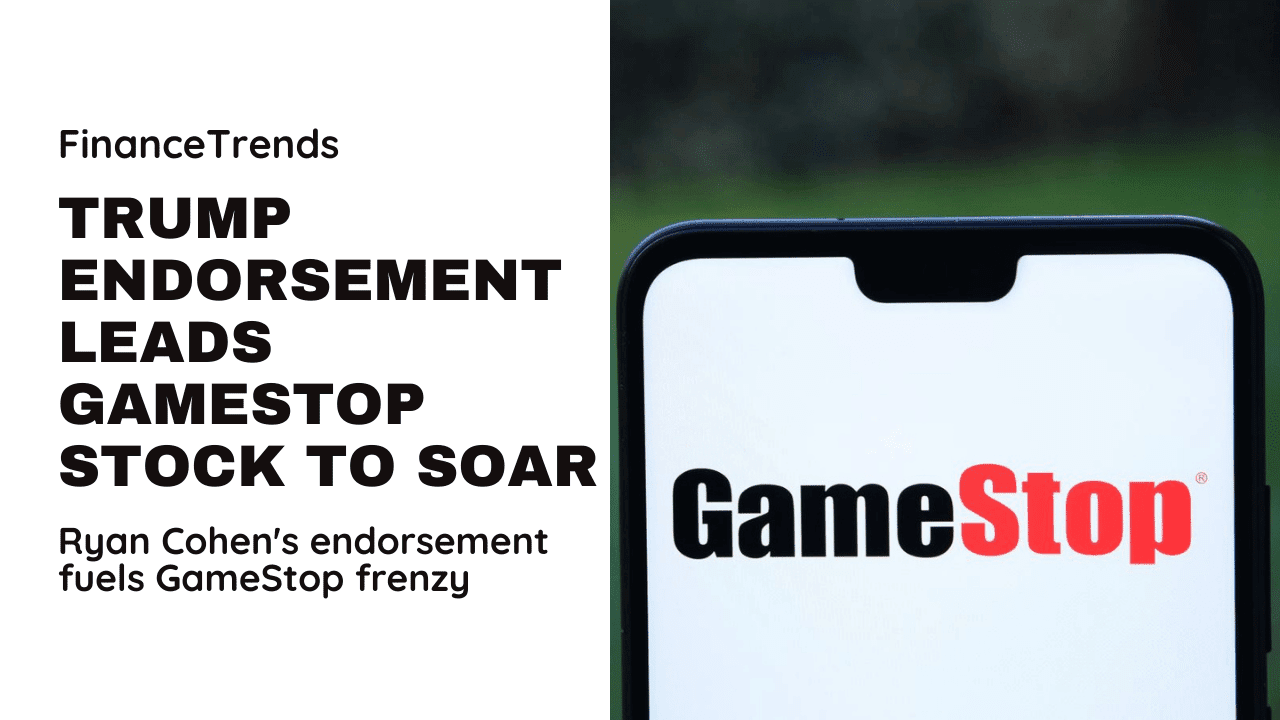Table of Contents
Introduction:
In an unexpected turn of events, GameStop (NYSE: GME) stock experienced a notable surge this week following an endorsement by CEO Ryan Cohen for former President Donald Trump in the upcoming 2024 election. Cohen’s announcement, made via a simple yet powerful post on X (formerly Twitter), has elicited strong reactions from both investors and political enthusiasts. This development not only highlights the intersection of politics and business but also underscores the volatility and influence that social media endorsements can wield in the financial world.
Ryan Cohen’s Bold Move:
Ryan Cohen, known for his strategic leadership and pivotal role in GameStop’s transformation, took to X to express his support for Trump. His post, succinctly stating “Trump 2024,” followed a highly publicized assassination attempt on the former president. The post quickly went viral, drawing a mix of praise and criticism. While some hailed Cohen’s bold stance, others questioned the prudence of a CEO delving into political endorsements.
The Reaction:
The response to Cohen’s endorsement was swift and polarized. Many users on X praised the CEO for his support, aligning with the growing number of finance figures backing Trump. However, critics accused Cohen of hypocrisy, pointing to his previous statements advocating for businesses to remain apolitical. This divide was evident in the numerous reactions and debates that ensued on social media platforms.
One user commented, “CEOs should stay out of politics, especially when they should want to garner loyalty and support from across the political spectrum – not lose half their base of supporters.” Another user, however, defended Cohen, stating, “But he is not tweeting as GameStop. He is tweeting from his personal account. They are definitely connected and sometime intertwined but it’s his right.”
This dichotomy in reactions underscores the complexities CEOs face when they step into the political arena. While their personal views are their own, the line between personal and corporate identity can often blur, leading to significant repercussions for the companies they lead. For Cohen, this move could either solidify his standing among like-minded supporters or alienate a segment of GameStop’s customer and investor base.
The Broader Impact:
Cohen’s endorsement is part of a larger trend of high-profile endorsements for Trump from prominent figures in the finance and tech industries. Tesla (NASDAQ:TSLA) CEO Elon Musk and billionaire hedge fund manager Bill Ackman also publicly voiced their support for Trump, adding significant weight to his campaign.
Elon Musk and Bill Ackman Join the Chorus:
Elon Musk, known for his influential presence in the tech world, announced his support for Trump, further amplifying the endorsement’s impact. Musk committed around $45 million per month to a pro-Trump super PAC called America PAC, which already boasts backers like Palantir (NYSE:PLTR) co-founder Joe Lonsdale, the Winklevoss twins, and Kelly and Joe Craft.
Bill Ackman, on the other hand, provided a detailed rationale for his support. In a lengthy post, Ackman criticized mainstream media’s portrayal of Trump and urged the public to keep an open mind regarding the upcoming election. He emphasized the importance of sourcing information beyond mainstream channels, highlighting a growing distrust in traditional media.
Ackman’s post read, “Please keep an open mind on the upcoming presidential election. Bear in mind that your views on Trump have likely been dramatically affected if you have sourced your info on Trump from mainstream media or friends or family who have relied on mainstream media as a source of knowledge. We have all recently learned in the starkest manner (the debate) how we cannot rely on the MSM as our source of truth on the ultimate political question.”
With the two influential figures behind the former president, Trump has gained some potentially sizable funding sources. This financial backing could prove crucial in the race to the White House, providing the necessary resources to bolster his campaign and reach a wider audience.
The Market Response:
The wave of endorsements had a palpable effect on the stock market, particularly on GME stock. Since Cohen’s announcement, GameStop shares have climbed 11% this week alone. Investors appear buoyed by the potential financial backing and influence these endorsements could bring to Trump’s campaign. GME has enjoyed a robust performance in 2024, with a 67% increase year-to-date, reflecting strong market confidence.
This market reaction highlights the significant impact political endorsements can have on stock performance. Investors often react swiftly to such news, factoring in the potential benefits or risks associated with the political landscape. In the case of GameStop, Cohen’s endorsement has been interpreted positively, at least in the short term, as a sign of potential stability and growth.
Historical Context:
Historically, political endorsements by CEOs have led to varied outcomes. For instance, companies like Nike and Starbucks have seen both backlash and support following their public stances on social issues and political matters. The financial implications of these endorsements can range from short-term volatility to long-term brand loyalty shifts.
For GameStop, Cohen’s endorsement comes at a crucial time. The company has been navigating a significant transformation, shifting from a brick-and-mortar retail focus to a more digital and e-commerce-oriented strategy. This endorsement could potentially influence the company’s trajectory, depending on how it resonates with its core audience and investor base.
Analyzing the Implications:
For GameStop:
Cohen’s endorsement of Trump is likely to have mixed implications for GameStop. On one hand, the increased media attention and stock surge reflect positively on the company’s market presence. The endorsement could attract new investors who align with Cohen’s political views, bolstering the stock’s performance further.
On the other hand, the political endorsement risks alienating a portion of GameStop’s customer base, potentially affecting consumer sentiment and loyalty. In an era where consumers are increasingly conscious of corporate values and political stances, this move could lead to boycotts or negative publicity among those who oppose Trump.
For the Market:
The intertwining of business and politics continues to be a contentious issue. CEOs endorsing political candidates can lead to significant market movements, as seen with GameStop and other companies. These endorsements can also shape investor perceptions and decisions, highlighting the broader implications of corporate leaders’ political stances.
The financial world is watching closely as more CEOs make their political preferences known. The ripple effects of these endorsements can extend beyond individual companies, influencing market trends and investor behavior. As the 2024 election approaches, the intersection of politics and business will likely intensify, with potential ramifications for the stock market and the broader economy.
Conclusion:
Ryan Cohen’s endorsement of Donald Trump has undeniably stirred the financial and political landscapes. As GameStop’s stock climbs and debates rage on, this development serves as a reminder of the profound influence that corporate leaders and their political views can exert on the market. Whether this endorsement will ultimately benefit or hinder GameStop remains to be seen, but it has undoubtedly added a new layer of complexity to the intersection of business and politics in 2024.
As investors and consumers continue to navigate this evolving landscape, the implications of such endorsements will be closely scrutinized. For now, GameStop’s stock surge serves as a testament to the immediate impact of Cohen’s bold political stance, setting the stage for an intriguing election year filled with economic and market uncertainties.










